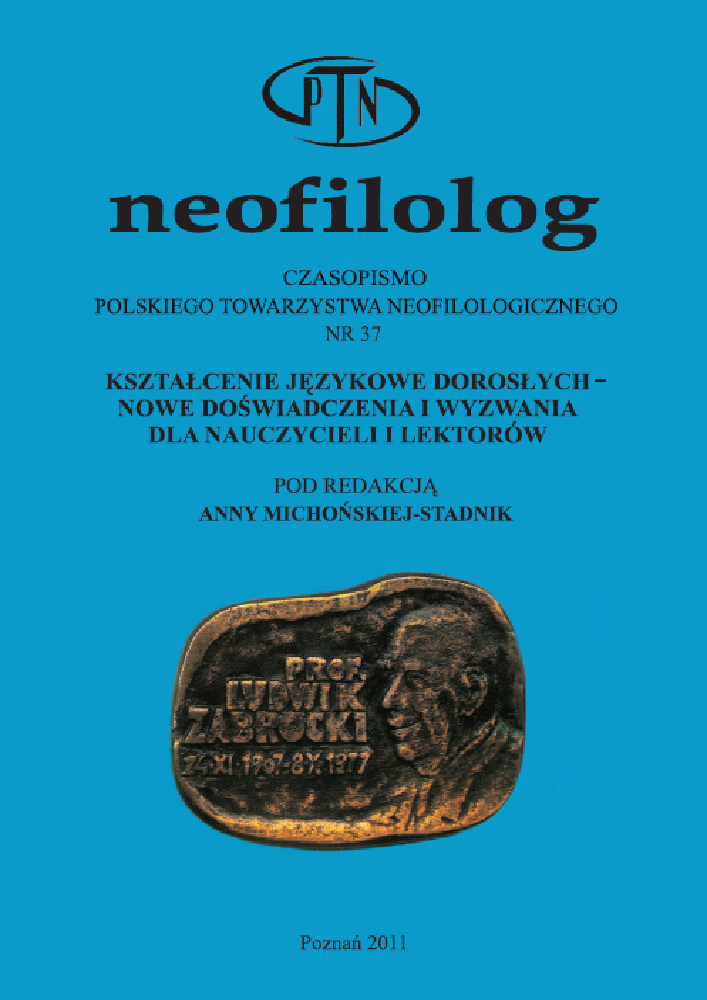Abstract
This paper concerns the teaching of foreign languages to adults with special attention given to the concept of motivation. The present author wishes to present the findings of his small-scale research done on a group of adults and their teachers as regards the sources of motivation in the context of adult language instruction. To begin with, an overview of the notion of mo-tivation is followed by its typology and current state of knowledge about teaching languages to adults is briefly outlined. The second part of the arti-cle demonstrates the procedure and results of the study.
References
Arnold, J. i Brown, H. D. 2005. „A map of the terrain” (w:) Affect in language learning (red. J. Arnold) Cambridge: Cambridge University Press: 1-24.
Brown, H. D. 1990. „M&Ms for the language classroom? Another look at motivation” (w:) Georgetown University Round table on languages and linguistics (red. J. E. Alatis) Washington, DC: Georgetown University Press.
Chomsky, N. 1988. Language and problems of knowledge. Cambridge, MA: MIT Press.
Dörnyei, Z. 1990. „Conceptualizing motivation in foreign language learning”. Language Learning 40: 45-78.
Dörnyei, Z. 1994. „Motivation and motivating in the foreign language class-room”. Modern Language Journal 78: 273-284.
Dörnyei, Z. 2003. Questionnaires in second language research. Mahwah, NJ: Lawrence Erlbaum.
Figarski, W. 2003. Proces glottodydaktyczny w szkole. Warszawa: Wydawnictwa Uni-wersytetu Warszawskiego.
Gardner, R. C. i Lambert, W. 1972. Attitudes and motivation in second language learning. Rowley, MA: Newbury House.
Gardner, R. C. i MacIntyre, P. D. 1993. „A student’s contribution to second language learning. Part II: affective variables”. Language teaching 26: 1-11.
Humphreys, G. i. Spratt, M. 2008. „Many languages, many motivations. A study of Hong Kong students’ motivation to learn different target languages”. System 36: 607-623.
Knowles, M. S., Holton III, E. F. i Swanson, R. A. (red.) 2009. Edukacja doro-słych. Warszawa: PWN.
Lankiewicz, H. A. 2010. Foundations of second language acquisition. From theory to language pedagogy. Piła: Państwowa Wyższa Szkoła Zawodowa.
Marczuk, M. 1994. „Próba określenia andragonicznego modelu procesu kształcenia dorosłych” (w:) Problemy i dylematy andragogiki (red. M. Marczuk). Lublin-Radom: UMCS.
Maslow, A. 2006. Motywacja i osobowość. Warszawa: Wydawnictwo Naukowe PWN.
Michońska-Stadnik, A. 2008. „Pojęcie motywacji – wczoraj, dziś i jutro” (w:) Nowe spojrzenia na motywację w dydaktyce języków obcych. Tom 1. (red. A. Mi-chońska-Stadnik i Z. Wąsik). Wrocław: Wydawnictwo Wyższej Szkoły Filologicznej we Wrocławiu: 107-117.
Oxford, R. 2007. „Language learning strategies” (w:) Teaching English to speakers of other languages (red. R. Carter i D. Nunan) Cambridge: Cambridge Univer-sity Press: 166-173.
Weiner, B. 1985. „An attributional theory of achievement, motivation and emo-tion”. Psychological Review 92: 548-573.
Wilczyńska, W i Michońska-Stadnik, A. 2010. Metodologia badań w glottodydaktyce. Wprowadzenie. Kraków: Avalon.
Williams, M. i Burden, R. L. 2007. Psychology for language teachers. Cambridge: Cambridge University Press.
Zawadzka, E. 2004. Nauczyciele języków obcych w dobie przemian. Kraków: Impuls.
License
Copyright (c) 1970 Tomasz Róg

This work is licensed under a Creative Commons Attribution-NoDerivatives 4.0 International License.
Authors
Authors of texts accepted for publication in Neofilolog are required to complete, sign and return to the Editorial team’s office the Agreement for granting a royalty-free license to works with a commitment to grant a CC sub-license.
Under the agreement, the authors of the texts published in Neofilolog grant Adam Mickiewicz University in Poznań a non-exclusive, royalty-free license and authorize the use of Attribution-NoDerivatives 4.0 International (CC BY-ND 4.0) Creative Commons sub-license.
The authors retain the right to the free disposal of the work.
Users
Interested Internet users are entitled to use works that have been published in Neofilolog since 2017, under the following conditions:
▪ attribution – obligation to provide, together with the distributed work, information about the authorship, title, source (link to the original work, DOI) and the license itself.
▪ no derivatives – the work must be preserved in its original form. Without the author's consent, it is not possible to distribute the modified work in the form of translations, publications, etc.
Copyrights are reserved for all texts published since 2017.
Miscellaneous
Adam Mickiewicz University in Poznań retains the property right as a whole (layout, graphic form, title, cover design, logo etc.).
